
Tulipa turkestanica, the Turkestan tulip, is a species of tulip native to Central Asia. It was first described by Eduard August von Regel in 1873 as a variety of T. sylvestris, then elevated to full species status two years later.
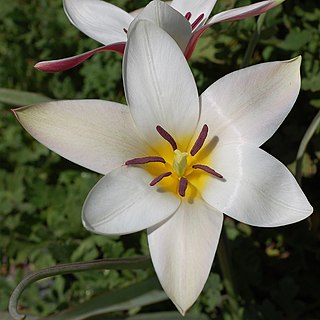
Tulipa clusiana, the lady tulip, is an Asian species of tulip native to Afghanistan, Iran, Iraq, Pakistan and the western Himalayas. It is widely cultivated as an ornamental and is reportedly naturalized in France, Spain, Portugal, Italy, Tunisia, Greece, and Turkey.

Tulipa gesneriana, the Didier's tulip or garden tulip, is a species of plant in the lily family, cultivated as an ornamental in many countries because of its large, showy flowers. This tall, late-blooming species has a single blooming flower and linear or broadly lanceolate leaves. This is a complex hybridized neo-species, and can also be called Tulipa × gesneriana. Most of the cultivars of tulip are derived from Tulipa gesneriana. It has become naturalised in parts of central and southern Europe and scattered locations in North America.

Amana is a small genus of flowering bulbs in the lily family, closely related to tulips and included in Tulipa by some authors. Amana is found in China, Japan and Korea. As of March 2024 the World Checklist of Selected Plant Families recognizes six species, three of which were formerly placed in the genus Tulipa:
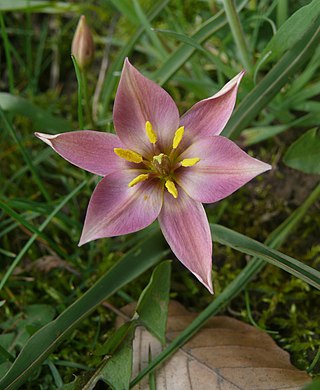
Tulipa humilis is a species of flowering plant in the lily family, found in Syria, Lebanon, Israel, Turkey, Iran, and the North Caucasus region of Russia. The flowers are pink with yellow centers. Its preferred habitat are rocky mountain slopes. It is known by several other names in horticulture.
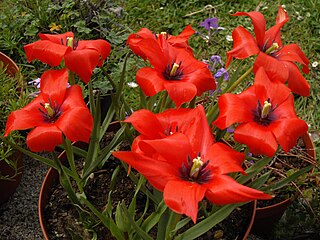
Tulipa linifolia, the flax-leaved tulip or Bokhara tulip, is a species of flowering plant in the tulip genus Tulipa, family Liliaceae, native to Tajikistan, Uzbekistan, northern Iran and Afghanistan. Growing to 20 cm (8 in) tall, it is a bulbous perennial with wavy red-margined sword-shaped leaves, and bowl-shaped red flowers in early to mid-spring. Each petal has blackish marks at the base.
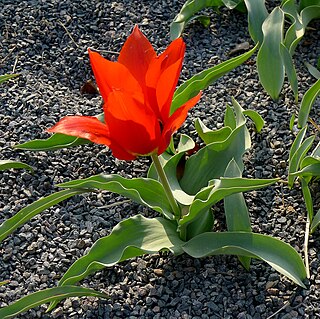
Tulipa eichleri, commonly known as Eichler tulip or Eichler's tulip, is a species of tulip. It is a bulbous flowering perennial with long green leaves,deep red flowers with a central black blotch, coming from the Caucasus Mountains.

The taxonomy of Tulipa places the genus in the family Liliaceae, and subdivides it as four subgenera, and comprises about 75 species.
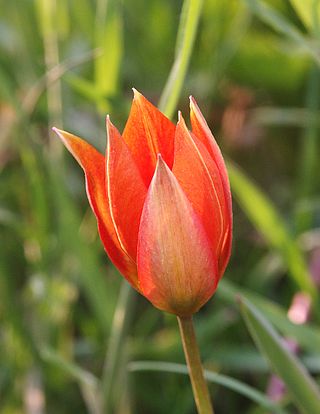
Tulipa orphanidea is a species of flowering plant in the Liliaceae family. It was described by Pierre Edmond Boissier and Theodor Heinrich Hermann von Heldreich (1862).

Tulipa biflora, the two-flowered tulip, is a species of tulip, native to the former Yugoslavia, Crimea, Anatolia, the Caucasus, southern Russia, Egypt, the Middle East, Central Asia, Iran, Pakistan, Afghanistan and Xinjiang in China. It has many synonyms, including Tulipa polychroma.

Tulipa fosteriana is a species of tulip, native to the Pamir Mountains and nearby areas of Afghanistan, Kyrgyzstan, Tajikistan and Uzbekistan.
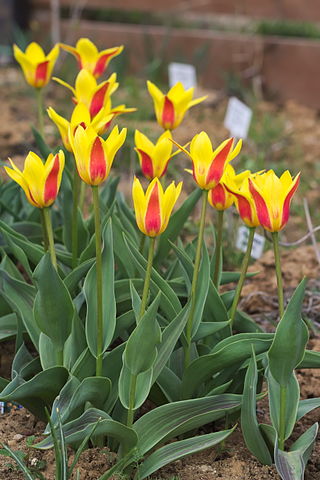
Tulipa kaufmanniana, the water lily tulip, is a species of tulip native to Central Asia.

Tulipa greigii, is a species of tulip native to Central Asia and Iran.

Tulipa praestans is a species of tulip native to the mountains of Tajikistan. Many well known cultivars have been formed from the original plant.

Tulipa kolpakowskiana, or Kolpakowsky's tulip, is a species of tulip native to Afghanistan, Kazakhstan, Kyrgyzstan, and Xinjiang in China. Its petals display a floral iridescence which is perceived by bumblebees. It has gained the Royal Horticultural Society's Award of Garden Merit. Its ultimate height and spread ranges from 0.1 to 0.5 metres and 0 to 0.1 metres, respectively.
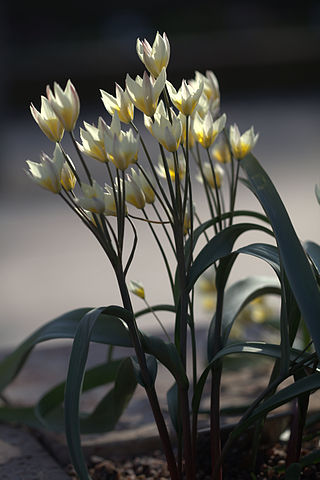
Tulipa bifloriformis is a species of tulip native to Central Asia. Its dwarfed 'Starlight' cultivar has gained the Royal Horticultural Society's Award of Garden Merit.
Tulipa ferganica is a species of flowering plant in the family Liliaceae, native to Uzbekistan and Kyrgyzstan. It has bright yellow flowers with the three outer petals brushed a brownish-pink, and its slender grey-green leaves have wavy edges. A bulbous geophyte reaching 15 to 25 cm, it is typically found growing on the rocky hillsides surrounding the Fergana Valley. One of the so-called species tulips, it may be available from specialty suppliers.
Tulipa ulophylla is a species of flowering plant in the family Liliaceae. It is native to the Alborz mountains of Iran. A bulbous geophyte, it is found at elevations from 600 to 2,500 m. One of the so-called species tulips, it is not available from commercial suppliers.

Tulipa ingens, the huge tulip, is a species of flowering plant in the family Liliaceae, native to Uzbekistan and Tajikistan. A bulbous geophyte reaching 40 cm (16 in), it is found growing in only 45 to 55 stations at elevations from 1,200 to 2,500 m. The Royal Horticultural Society lists it as a dwarf tulip, stating that it blooms in early spring with black-centered scarlet red flowers.

Tulipa cretica, the Cretan tulip, is a species of flowering plant in the family Liliaceae, endemic to Crete. A bulbous geophyte reaching 25 cm (10 in) with white flowers that fade to pink, it is typically found growing in rocky habitats such as noncoastal cliffs and mountain peaks. There are a number of cultivars, including 'Dikti', 'Archanes', and 'Chania', with 'Hilde' being available from commercial suppliers.


















